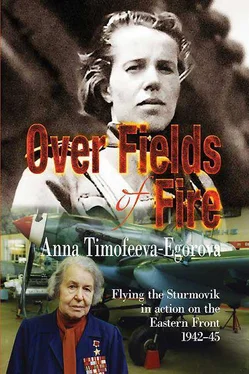A pilot from our squadron called Spirin flew to the Front headquarters with secret mail. When he came back after handing in the package his plane had disappeared from the parking lot. Spirin ran all over the aerodrome but the U-2 with number ‘7’ on its tail had vanished. Spirin reported his plight to the squadron and the squadron commander sent me with navigator Irkoutskiy to search for the vanished plane. We flew to all the aerodromes and airstrips of the Southern and South-Western Fronts but couldn’t find it. We arrived at the of Chougouyev aerodrome hungry and angry and decided to get hold of some food. Everyone was in the process of evacuation and there were enemy air raids over and over again. They wouldn’t even give us bread in the aerodrome canteen without ration cards (we had none on us)! Irkoutskiy ran to see the local commanders and I got back to the plane and saw a major sitting in my cockpit and yelling: “Contact!” Another airman (also a major) pulled the propeller with his hands and yelled running away from the propeller: “Aye-aye!” I stood stunned, then jumped on a wing of my plane and began thrashing the major, sitting in the cockpit, with my fists!
“You thief! Thief! Shame on you!” I was yelling, but he turned his face to me and said quietly: “Why are you screaming like in the bazaar? Had you said civilly that it was yours we would have gone to look for another ‘unclaimed’ one. But you’ve started screaming instead and even hitting…” He climbed out of the cockpit and strode away from the parking lot and the second major minced after him. For some reason I felt sorry for them…
During the retreat we often shifted base and changed airstrips, choosing them beside some forest or village. Our airstrips were under fire time and again, and sometimes bombed. But despite the difficulties and deprivations related to the retreat the morale of Major Boulkin’s squadron remained high.
“Fly a sortie and see whose troops are moving along the roads in this area”, the squadron commander once ordered me, making a mark on a map. Flying in the daytime in a plane made of plywood and percale, which can be shot down by an ordinary rifle, wasn’t a pleasant exercise. But an order is an order…
The troops on the roads turned out to be ours. “They are escaping encirclement”, I guessed. Exhausted and worn out, they were carrying their weapons and their wounded. Noticing a red-starred plane they began to wave their hands, field caps and helmets. But what’s this? Four Messerschmitts were diving on the column. For the first time I see the fiery thread of tracer. Soldiers were dropping, some ran away from the road…
Having made several passes on the column the Fascists pounced on my plane. A forest and a river winding between the trees saved me then. Nearly touching water with my undercarriage I followed all its curves and meanders. The manoeuvre was successful — the Germans fell back.
I returned to the aerodrome, landed and taxied to the parking lot. Dronov the mechanic greeted my return rapturously as always. And he had to patch up holes and fix up the plane and its engine after almost every one of my sorties! Nevertheless he had always managed to make my machine flight-ready for the next sortie.
There were many Moscovites in our squadron but that was no wonder: after all, it had been formed in Lyubertsy 74 74 Translator’s note — a small town near Moscow.
. Every morning our radio-operators were asked:
“Guys, what’s happening in the capital?”
Moscow was doing it hard: her most terrible days had arrived. The enemy stood at her gates, air-raid warnings were announced nearly every night. But the Moscovites faced the oncoming threat with fortitude. People of the most peaceful occupations: cooks and scientists, clerks and steel-makers, artists, engineers and confectioners were joining opolchenie 75 75 Translator’s note — volunteers, home guard.
divisions. Moscow itself was turning into a fortress…
After capturing Mariupol and Taganrog the Fascists began to advance on our Southern Front. We flew to the Army Headquarters and to divisions several times a day. The Hitlerites aimed to penetrate into the Shakhty district and from there to Novocherkassk and Rostov. And indeed they managed to press our troops up against Novocherkassk but then the troops of Kharitonov’s army, fighting to the bitter end, didn’t allow the enemy to move forward even a metre. Abandoning the idea of capturing Rostov from the North and North-East, where our 9th Army had stopped them, the Hitlerites decided to deliver a frontal blow on Rostov. On 21 November the Fascists took Rostov. The very same day we relocated to the Lotikov Shaft airstrip near Voroshilovsk…
In the middle of the night a messenger woke the pilot Grishchenko and navigator Irkoutskiy. They were ordered by squadron headquarters to fly to the 37th Army with a top-secret package. We decided straightaway that it was obvious some operation by frontline and army troops was being planned. The nights are dark in autumn, especially in the South — and our planes were completely unadapted for night flights. In spite of this Grishchenko and Irkoutskiy flew the route safely and recognised the village where the headquarters of General Lopatin’s 37th Army was located. They made several circles around the station but there was no sign of a landing strip — not even a lit torch. But no matter how long you are going to make circles there were orders to deliver the package at any cost and so Grishchenko slowed down, turned the ignition off and began to glide. They flew over a hut, then above something just as dark and at last the plane touched down and began taxiing. But the flyers were still sighing with relief when the plane at first abruptly rolled down, then suddenly up and at the same moment smashed into something. Grishchenko came back to his senses first and asked Irkoutskiy “Ivan, are you alright?”
“I am, but my hand hurts for some reason.”
“And my foot’s trapped, I can’t pull it out…”
At last they made it out of the broken plane and went to look for the Army headquarters. It was still dark and quiet in the village — not even a single dog began to bark. However, they found the headquarters, handed in the package and told of their landing. The flyers were walked to a hut where wounded men lay on the floor on straw. Grishchenko’s leg was badly grazed and Irkoutskiy had broken fingers. They remembered there was a dying young female medic amongst the wounded, injured on her buttocks… In the morning the army communications commander Colonel Boborykin ordered the smashed plane burnt. The guys were not censured for that flight but were not commended either.
Our troops began to advance and now Rostov was liberated from the occupiers. An enemy attempt to consolidate his grip on positions prepared beforehand was frustrated and the Red Army troops kept pressing the enemy westward. Boulkin’s squadron relocated to the Filippenko hamlet and the Front headquarters to the town of Kamensk on the Northern Donets river. I was very happy about that: all these months I’d been thinking with fear that my family might fall under occupation. My mum had written me that the Fascists were very close to our Kouvshinovskiy District. The Red Army liberated the city of Kalinin on 16 December. Torzhok hadn’t been held by the Germans but they had destroyed it completely. “So many churches, ancient cathedrals — they razed it all to the ground, those antichrists”, my mum wrote. She further advised that Konev’s headquarters 76 76 Translator’s note — Ivan Konev — one of the top Soviet commanders later in the war.
had been located not far from our village and his officers were billeted at her place.
“They are so lovely and kind. I heat up the samovar for them, make tea from various herbs and they procure some sugar — we sit and drink tea with them, they tell me all sorts of news from all fronts. I used to question them about you, showed them your letter from the front. They said: “Your daughter is alright, Stepanida Vasilievna, there’s a lull at that sector of the front now”. They might be telling me untruths but it was so convincing and polite. You, my girl, don’t worry about me, I’m fine, it’s only you — my kids and grandchildren, my heart aches for. Nothing’s been heard from Egoroushka for a long time, since the very beginning of the war, since he wrote me that he was going to hit the enemy, that was all. Kostya is somewhere at the Southern Front. Kolyushka’s been badly wounded and he’s in hospital now, Zina is in Leningrad, blockaded, working as a foreman at the ‘Krasnyy Gvozdil’shik’ plant. A death notice came about Vanyusha. Maria is in such a state from grief that she looks like death warmed up. I know nothing about Alexey — there’s been nothing from him since he wrote me from Drogobych about his daughter Lilya’s birth shortly before the war. Vasya keeps applying from Norilsk for permission go to the front but no one’s answering. How are you, my girl? Take care of yourself, dress yourself warmly. I’ve knitted mittens for you with two fingers so you can shoot easier…”
Читать дальше












